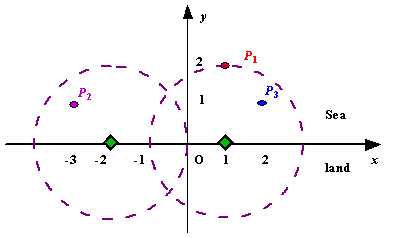Radar Installation
| Time Limit: 1000MS |
| Memory Limit: 10000K |
| Total Submissions: 64148 |
| Accepted: 14422 |
Description
Assume the coasting is an infinite straight line. Land is in one side of coasting, sea in the other. Each small island is a point locating in the sea side. And any radar installation, locating on the coasting, can only cover d distance, so an island in the sea can be covered by a radius installation, if the distance between them is at most d.
We use Cartesian coordinate system, defining the coasting is the x-axis. The sea side is above x-axis, and the land side below. Given the position of each island in the sea, and given the distance of the coverage of the radar installation, your task is to write a program to find the minimal number of radar installations to cover all the islands. Note that the position of an island is represented by its x-y coordinates.

Figure A Sample Input of Radar Installations
We use Cartesian coordinate system, defining the coasting is the x-axis. The sea side is above x-axis, and the land side below. Given the position of each island in the sea, and given the distance of the coverage of the radar installation, your task is to write a program to find the minimal number of radar installations to cover all the islands. Note that the position of an island is represented by its x-y coordinates.

Figure A Sample Input of Radar Installations
Input
The input consists of several test cases. The first line of each case contains two integers n (1<=n<=1000) and d, where n is the number of islands in the sea and d is the distance of coverage of the radar installation. This is followed by n lines each containing two integers representing the coordinate of the position of each island. Then a blank line follows to separate the cases.
The input is terminated by a line containing pair of zeros
The input is terminated by a line containing pair of zeros
Output
For each test case output one line consisting of the test case number followed by the minimal number of radar installations needed. "-1" installation means no solution for that case.
Sample Input
3 2
1 2
-3 1
2 1
1 2
0 2
0 0
Sample Output
Case 1: 2
Case 2: 1
已疯,常年POJ,不成神,必得神经病。
首先吐槽下hdu的Web-DIY的渣渣测试数据,和炒鸡不稳定的系统。一份代码居然出现了RE,超时,AC三个结果,特么在逗我吧!!!
POJ数据太特么变态了,已哭。。。。。
解题思路:
将二维坐标转换为一维坐标上的区间。求最小点覆盖所有区间。
如果小岛能被雷达覆盖,则转换在一维坐标上的最大区间为,[x-sqrt(d*d*1.0-y*y),x+sqrt(d*d*1.0-y*y)]
如果其中某个小岛不能被覆盖,则用标记变量标记。直接输出-1。
如果所有小岛都能被雷达覆盖,则进行贪心策略。
对所有区间右端进行从小大到排序(右端相同时,左端从大到小排序),则如果出现区间包含的情况,小区间一定排在前面。
然后开始遍历区间。如果当前区间超过上一个区间的覆盖范围,则雷达数+1。
第一个区间去最右值。
证明:如果第一个区间不取最右值,而取中间的点,那么把点移到最右端,被满足的区间增加了。而原先被满足的区间现在一定被满足。
#include <cstdio>
#include <cmath>
#include <algorithm>
const int maxn = 1010;
using namespace std;
struct radar
{
double s,e;
}arr[maxn];
bool cmp(radar x,radar y)
{
if(x.e==y.e) return x.s>y.s;
else return x.e<y.e;
}
int main()
{
int n,d,i,x,y,flag,count;
int k=1;
double temp;
while(scanf("%d%d",&n,&d))
{
if(n==0&&d==0) break;
flag=0; //标记是否有小岛无法被覆盖
for(i=0;i<n;++i)
{
scanf("%d%d",&x,&y);
if(y>d)
{
flag=1; //如果雷达不足以覆盖,则标记
continue;
}
temp=sqrt(d*d*1.0-y*y);
arr[i].s=x-temp;
arr[i].e=x+temp;
}
printf("Case %d: ",k++);
if(flag)
{
printf("-1\n");
continue;
}
sort(arr,arr+n,cmp);
count = 1;
temp=arr[0].e;
for(i=1;i<n;++i)
{
if(arr[i].s>temp)
{
temp=arr[i].e;
count++;
}
}
printf("%d\n",count);
}
return 0;
}






















 1106
1106

 被折叠的 条评论
为什么被折叠?
被折叠的 条评论
为什么被折叠?








